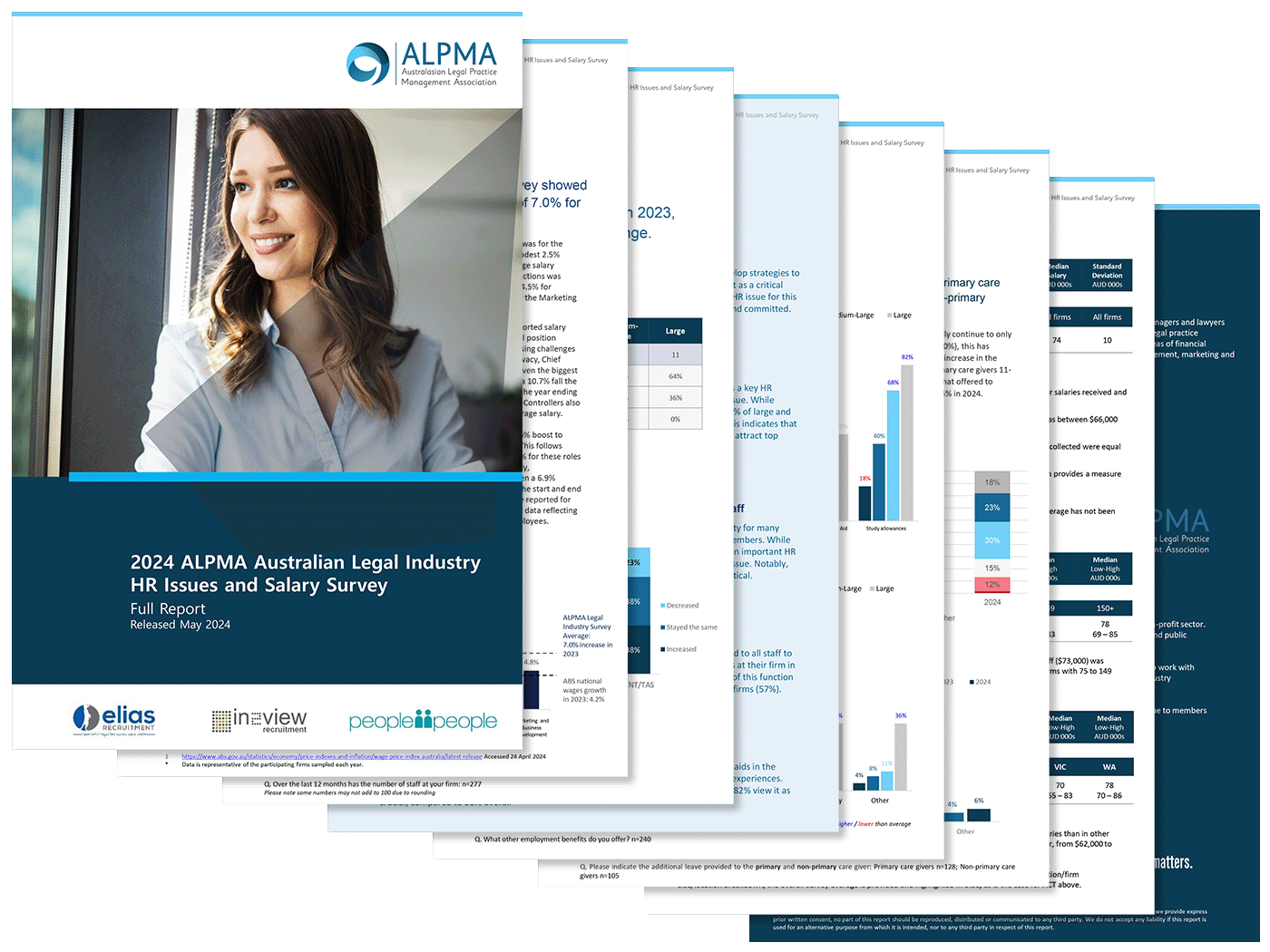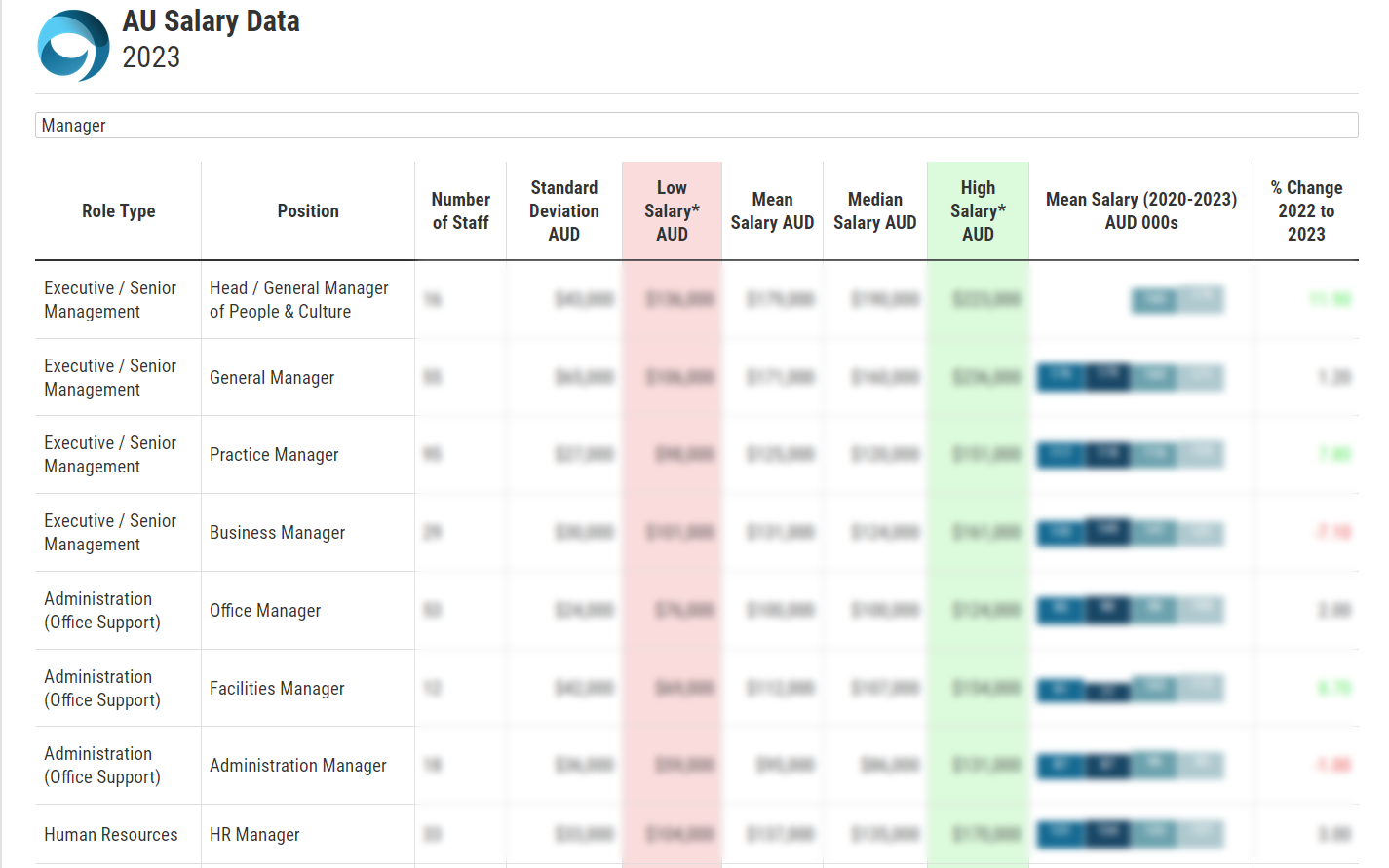20 March 2025
2024 ALPMA Australian Legal Industry HR Issues & Salary Survey
Location
Australia
Report released on
16 May 2024
The final 2024 Australian report is now available for purchase, including salary data segmented by position, location, firm size and practice area. The final report also covers the staff profile at Australian law firms, bonuses and retention policies, attraction strategies, and HR issues for law firms over the next 12 months.
In 2024, over 270 Australian law offices, employing over 8,800 people, reported their employment and staffing experiences as of 1 January 2024, making it the most comprehensive, independent HR and remuneration study (including actual salaries paid) within the legal industry.
If you participated in this research, we have sent you a code to access the research for free. Check your emails or contact us for assistance.
Firms who did not participate can purchase the report for $550 (ALPMA members) or $2,200 (non-members). All prices include GST.
2024 Key Findings
Australian legal industry wage growth saw a rise of 7%, outstripping national average wage growth.
7.0%
Legal Industry
4.2%
National
Employment growth slowed over the last twelve months — only two in five firms increasing their headcount. Staffing levels also failed to meet predictions from the last period — three in five firms predicted growth over 2023 (Source: 2023 ALPMA Australian Legal Industry HR Issues & Salary Survey.
Increased Headcount
Predicted an Increase
Almost half of Australian law firms are offering bonus payments to all staff — the highest level in five years.
Partners will look to earn the highest bonuses on average, with bonuses to support staff averaging less than 5% of their base salary.
All Staff
Management / Executives
Law firms reported continued progress in gender diversity of Equity Partners, with female representation reaching 26%.
There was also an increased focus on gender pay gap, with three in ten law firms conducting a pay gap analysis last year — up significantly from 1 in four over the year before.
A little over half of these firms found no difference — down considerably from 78% at the start of 2023.
For more details about how these factors differ based on location and firm size, read the final report.
Why purchase the report?
- provides insight into current & future issues in HR;
- defines staffing profiles & roles (70+ positions);
- outlines Firm & individual benefits;
- provides current salary data - from Graduates to Equity Partners (and everything in between);
- provides insights into anticipated salary increases & bonus structures;
- outlines recruitment intentions for the coming year;
- identifies other entitlements on offer at firms; and
- most importantly allows you to benchmark your firm against 270+ firms across Australia.

Access interactive salary data tables today
Not only does this comprehensive report provide you with up-to-date information and data, with which to benchmark your firm against various HR metrics, but firms can also access our new interactive salary data tables. Quickly search the salary data by position, sort by average salary, and see how wages have changed over time with this new online tool.

ALPMA Members
Become a Member and Save
Report Only
Positions & Roles covered in the current survey
The annual ALPMA Legal Industry HR Issues & Salary Report provides a comprehensive, independent review of salaries paid for over 70+ legal, management and support roles at Australian law firms, broken down by location and firm size so you can compare compensation strategies with like firms. As titles and responsibilities can vary between firms please see the position descriptions made available below.
If you are participating in the survey, you or your firm will need to collect staff numbers and salary data (highest, lowest and average salaries) for each of the following positions at the firm.
If there are positions that are not listed or covered by the descriptions, please make a suggestion on the form below. Other feedback on these position is also welcome.
Solicitors / Lawyers
Graduate
Has successfully completed a Law Degree and is undertaking further supervised work experience or training as governed by the relevant Law Societies and other legal bodies or institutions across Australasia to gain admission.
Lawyer *
Enter salary data based on a titled position first (E.g. Associate/ Senior Associate) then by PAE level. E.g. A Lawyer with 3 yrs PAE would be entered under Lawyer 3–4 years PAE but a 3 yr PAE Associate would be entered under Associate.
A qualified and admitted Legal Practitioner with years of Post Admission Experience (P.A.E.). Salaries to be entered by years of experience:
- 0–1 yr P.A.E.
- 1–2 yrs P.A.E.
- 2–3 yrs P.A.E.
- 3–4 yrs P.A.E.
- 4–5 yrs P.A.E.
- 5–6 yrs P.A.E.
- 6+ years P.A.E.
Associate *
A Lawyer with 3 – 5 years’ experience who has achieved a level of specialist knowledge that can be held out to the public as a representative of the firm.
Senior Associate *
A Lawyer with 5+ years’ experience held out to be an experienced representative of the firm on the path towards a Partner Position/Special Counsel/Consultant.
Special Counsel
A Lawyer with 7+ years’ experience. Appointment to Special Counsel can be a career path promotion towards Partnership or applied to a Senior Lawyer who is not seeking partnership as part of career goals. This person may also be a very senior lateral hire or person who has stepped down from Partnership.
General Counsel
An experienced Lawyer with 7+ years’ experience who typically is responsible for the in-house legal functions for a company, organisation or government department.
Consultant
Usually a lawyer whose role can range from a specialist advisor (like a Special Counsel), a Partner who has retired or been bought out (and may never come into the office), or can include an overseas qualified lawyer who is not yet admitted in Australia. This person may take the role of coach/mentor or client Relationship Manager and may also be a significant person on a retainer to appear at special events. This position relates to internal salaried consultants, not external consultants.
Salaried Partner **
Also known as Non-Equity Partner or Fixed Draw Partner. They do not receive a profit share but are subject to liability as a Partner. This is often an intermediary step to a full Equity Partner or may be recognition of seniority and prestige.
The term Partner or Salaried Partner is used throughout the survey but also applies to Directors or Non-Equity Directors.
Managing Partner **
Usually performed by an Equity Partner who has been given authority from the partnership to have overall responsibility for the firm’s partnership matters, practice management and other operational matters.
Equity Partner **
A Partner that shares in the profits and losses of the business, but who is not involved in its management.
* Note: Salaries should be entered based on title first then years PAE. For example: If a 4-year PAE Lawyer has the title of Associate then the salary for this individual should be entered under Associate. If a 4-year PAE lawyer has the title of Lawyer then the salary should be entered under 4–5 years PAE.
** Note: For partners please just average their regular drawings into an annual amount and include these figures. Do not include any additional profit share or top up payments received throughout the year.
Paralegals / Law Clerks
Paralegal (also referred to as Law Clerk)
Undertakes specialist legal duties under the supervision of a lawyer, usually in a very defined and process driven area. Eg Conveyancing, Mortgage, Debt Collection, and Personal Injury. They are frequently considered Fee Earners but are not qualified as a lawyer. They may have completed a Legal Diploma or Certificate. Salaries to be entered by years of experience:
Paralegal/Law Clerk (less than 5 yrs experience)
Paralegal/Law Clerk (5+ yrs experience)
Undergraduate Student Paralegal / Clerk (also referred to as a Vacation or Seasonal / Student Law Clerk)
Students recruited, often in their penultimate year, to assist and gain experience within the firm. Students undertake a range of tasks including simple legal tasks supervised by a lawyer, research or assisting on specific projects. Usually work on a part time basis or as a Summer/Winter Clerk.
Registered Conveyancer
A licensed conveyancer holds a current registered licence and has complied with the various requirements or units of competency under the relevant legislation or regulatory bodies.
Executive / Senior Management / C-Suite
Chief Executive Officer / Chief Operating Officer
A Chief Executive Officer (CEO) acts autonomously at a senior level within the firm (more senior than the General Manager), reporting to the board on significant issues. Usually a CEO would act in a firm of 100 staff and over. A Chief Operating Officer (COO) may handle the day to day operations in a significantly larger firm, but not the overall strategy. These roles vary significantly across firms.
Chief Financial Officer (CFO) / Financial Controller / Director
Qualified CA/CPA. Develops and implements the firm’s strategic financial goals and objectives, operational and legal team budgets and the firm’s financial KPIs. Supervises finance team, preparation of accounts, cash flow management and works at a high level and closely with the Managing Partner. Has overall responsibility for the firm’s finance.
Chief Information Officer (CIO) / Director
Designs, oversees and implements the firm’s IT strategy. This is a key managerial role in larger firms. Works closely with the other department managers to drive various IT initiatives to improve the firm wide operating systems and processors. Leverages technology in order to gain efficiencies in a commercial manner.
HR Director
Oversees staff operations, business planning and budget development of HR programs. They also plan, direct, and manage all human resource initiatives, such as recruitment, compensation, benefits, training and employee relations of the firm.
Head / General Manager of People & Culture
Provides strategic direction to the business working closely with the executive/ leadership team including the Managing Partner or MD; Heads of Finance, Operations, IT and other business leads. Supervisory responsibility for a small team. Advises the leadership team on succession planning, remuneration strategy, key business metrics, coaches senior leaders in the business.
General Manager
A General Manager usually supervises other specialist areas of the firm such as Finance, HR, IT, Marketing and has the overall responsibility of managing revenue, costs and growth. A General Manager is given authority and autonomy to act in the role and liaises and reports to the Partners or a Managing Partner.
Practice Manager
Generally in a smaller firm, a Practice Manager is responsible for the supervision of specialist areas such as Finance, HR, IT, Marketing and the overall responsibility of managing revenue, costs and growth, under greater supervision from managing partner, less autonomy.
Business Manager
The role of a Business Manager can vary between firms, but often they work closely with the Partners, particularly the Managing Partner of the firm to design and implement the firm’s strategic plan. The Business Manager may look after specialist functions such as Marketing, Business Development, HR, IT, and Administration and work closely with the Finance department.
Secretarial Support (Legal Team)
Legal Secretary
This person performs all secretarial duties for a lawyer or a small group of lawyers. Requires knowledge of policies, procedures, precedents and specialised terminology and maintains a working knowledge of a lawyer’s area of practice. Salaries to be entered by years of experience:
- Trainee Secretary/Assistant 0 – 1 year
- Junior Secretary 1 – 2 years
- Legal Secretary 3 – 5 years
- Legal Secretary 5 years +
Word Processor
An experienced operator dedicated to document production with a good understanding of the work practice and precedents, often working for many areas of the firm.
Administration (Office Support)
Office Manager
Responsible for all day to day administration and office co-ordination tasks for the firm. This is a varied role and typically has direct responsibility and supervision for the Administration, Secretarial and Accounts departments. An Office Manager could also be responsible for IT and HR functions within a smaller firm.
Facilities Manager
Often responsible for managing a back-office team and project manages staff, office refurbishments and space allocation, liaises with the landlord on building issues, rent and outgoings, and ensures the firm is compliant with the terms of the lease, fitouts and fixtures, and make good.
Office / Corporate Services Supervisor / Team Leader
This person is responsible for managing staff and delivery of service across the print or copy room, mail room, safe custody and archiving functions.
Administration Manager
An Administration Manager may supervise and manage staff in Accounts, Payroll, Reception, Outside Clerk and other supporting administration roles. This role is usually performed in a larger firm. This position may vary in status due to qualifications and experience required and as firm size varies.
Practice Administrator
A small firm position (up to 10 staff), or working with a sole practitioner undertaking secretarial duties and also responsible for trust, accounts and other office administration functions.
Executive Assistant
Provides high level administrative and confidential secretarial support, may attend partner or Board meetings, has strong communication and organisation skills and usually works for the Managing Partner, CEO, COO or CFO.
Receptionist
A client-facing role, meets and greets clients in reception, manages meeting room bookings and refreshments, attends to the telephone switch board and other office duties.
- Receptionist (3+ years’ experience)
- Junior Receptionist (0–3 years’ experience)
Outside Clerk / Rounds Clerk
Responsible for filing court documents in the required court, visiting government or other agencies to lodge legal documents, ensuring all documents comply with the standards, regulations and requirements for lodgement before attendance for filing, keeps abreast of any changes that will affect filing or lodgements and accordingly informs lawyers in the various legal teams.
Office Junior / Administration Assistant
Provides assistance and support with general office administration and other duties as needed. This is a varied role and could include such tasks as basic administration, stationery ordering, data entry, meeting refreshments and general errands.
Human Resources
HR Manager
Responsible for recruitment, career planning, performance reviews, grievance and disciplinary issues, compensation and benefits, professional and technical learning and development, policies and procedures, legal compliance, and instructs payroll. Works closely with the leadership team in the business. May lead a team or work autonomously in smaller practices. Usually appointed in a firm with over 40 staff and responsible to the Managing Partner.
HR Consultant / Advisor
Assists the HR Manager in the broad spectrum of the HR function. Takes an active role with recruitment and change management projects, advises staff on policies and procedures, has involvement with performance reviews and professional development. In smaller practices where no HR Manager has been appointed, works closely with the Managing Partner to fulfil the needs of the business.
HR Assistant / Administrator
Assists the HR Manager/HR Consultant across a variety of paper based and data entry activities.
Learning & Development / Training Manager
Works closely with the HR Manager, inducts new staff, develops and implements learning and development programs for all existing staff. Ensures legal staff meet CPD requirements and organises in-house training where appropriate. May play an important role in culture, motivation, bullying and harassment education and mental wellbeing. Sometimes may be involved in knowledge management where the firm does not have a Knowledge Manager. In smaller practices Training Manager can be a position or function within the HR team.
Learning & Development / Training Officer
Assists the Learning & Development/Training Manager as required or in smaller practices the Training Officer can be a position or function within the HR team with a lesser level of responsibility.
Innovation & Change Management Manager
This role may have a variety of titles, but the primary function is to drive innovation and change within a law firm. This role works closely with the executive teams and departments to manage innovation projects that deliver efficiencies, productivity and/or profitability improvements.
Information Technology
IT Manager
Oversees the firm’s IT strategy, and the computer systems, software and facilities to support the firm’s strategic objectives and goals. Tasks carried out within this role will vary greatly between firms. In smaller firms the role would be mixture of hands-on daily tasks combined with project based tasks whilst larger firms would involve a mixture of high level planning with project based tasks.
Helpdesk / Desktop / Support Officer
Attends to daily issues raised by users, sets up new users, monitors security and daily backups etc.
Customer / Client Experience Specialist (CXS)
This role works to improve the “experience” for clients, customers and employees when working with or for the firm. The aim of the role is to streamline, systemise and make all interactions with the firms seamless. Typically this person will have an IT background, be familiar with several computer program languages and will have the ability to be both strategic and operational.
IT Project Manager
Plans and works with external vendors and internal key stakeholders for the timely and efficient introduction of significant upgrades, additions to the IT infrastructure or outsourced facilities.
Network Engineer
An IT professional who provides planning and implementation skills to maintain or grow the firm’s local area network (LAN), wide area network (WAN), virtual private network (VPN), WiFi, intranet and internet, data and video capabilities.
Programmer / Data Analyst
An IT professional who can write code across multiple software platforms and specialises in analysing and designing information systems.
Finance
Finance Manager
Usually CA / CPA qualified. Accountant or an individual with relevant/significant financial experience. Responsible for hands-on supervision of the accounts team in daily transactions including Trust, Accounts Receivable (Debtors) Accounts Payable (Creditors) Billing, Reconciliations, Statutory and Tax reports.
Accountant
Usually qualified. Assists the CFO/Financial Controller with the preparation of quarterly and yearly accounts and assists with the production of specific financial reports and other tasks as required. Can assist the Partners with their individual and family trust tax returns, including management of private investment portfolios for accounting/tax implication purposes. Can assist with the production of client accounts during the billing cycle.
Assistant Accountant
Assists the Finance Manager/Accountant as required. Can be undertaking external study in Finance/Accounting.
Accounting Supervisor
Supports the Finance Manager or handles similar duties in a smaller firm. Not at a higher level and less responsibility. Can take particular responsibility for Trust transactions compliance and Audit responsibility.
Accounts Staff
Administration staff assisting the Finance Manager with the daily processing of accounts. Eg. Accounts Receivable, Accounts Payable, Bank Reconciliations, Billing.
Credit Control Staff / Accounts Receivable
Responsible for managing account reminders and collection of the firm’s debtors’ ledger including telephone reminders.
Bookkeeper / Payroll Assistant
A bookkeeper is responsible for processing data related to accounts payable and accounts receivable into a financial software program (E.g. Xero/MYOB) on behalf of the firm. A bookkeeper can raise invoices, receipt payments, reconcile bank accounts, chase debtors and provide some month end reporting.
Some bookkeepers may also be responsible for the accurate collation of staff time records, including accounting for annual leave and personal leave entitlements, and attending to pay run in accordance with relevant awards and other requirements for lawyers and administration staff. Can work in unison with HR team, if relevant for the firm size.
Knowledge Management
Precedent Manager / PSL / Governance / Risk Policy Officer
Often a qualified lawyer who writes, reviews and standardises precedents across the firm. Responsible for momentum and quality of documents produced. Could also be involved in KM system design or maintenance and training of the firm’s lawyers in the use of the precedent database and KM systems.
Precedent Development Officer
Works with the Precedent Manager in a large firm and independently in a small firm. Has advanced skills in precedent and document assembly programs. Ensures documents comply with firm style guide and are correctly identified.
Librarian / Records Manager
Responsible for selection and upkeep of firm library resources whether written or online. May also maintain a Knowledge Bank of cases, articles, training information, barristers’ opinions etc. that can be resourced by lawyers. May holds an applicable qualification. Responsible for the accurate entry, maintenance and retrieval of any Safe Custody and Archived documents held, physically or digitally, by the Firm.
Marketing & Business Development
Business Development Manager
Responsible for building and implementing business development activities to grow market position in conjunction with the Partners and senior lawyers within the firm. Often works with the HR Manager to develop individual BD plans. Generally works at a high level and closely with Managing Partner to identify BD opportunities. In larger firms the BDM can be responsible for generating new business for the firm and actively engages with clients to foster relationships and develop new opportunities. This role may include marketing activities.
Marketing Manager
Develops and implements the firm’s marketing plans including website development and management, development of marketing material, preparation of tenders, social media, event organisation and staff training.
Marketing Coordinator
Assists the Marketing Manager or Business Development Manager with tasks, as required.
Events Coordinator
Works with the Partners, Business Development Manager, Marketing Manager and external vendors to coordinate and manage all internal and external client events.
Digital / Graphic Designer / Desktop Publisher
Proficient in the use of specialist programs and software to design and produce brochures, flyers, infographics and marketing material for the firm.
Digital / Social Media Manager
Responsible for the planning and implementation of social media strategies to grow the firm’s business and to contribute, monitor, filter internal updates, measure and respond to feedback across all of the firm’s social media pages.
Digital / Social Media Assistant
Assists the Digital/Social Media Manager in a variety of tasks.
Need more information?
If you have any questions about the research or need assistance, please contact our research team.





